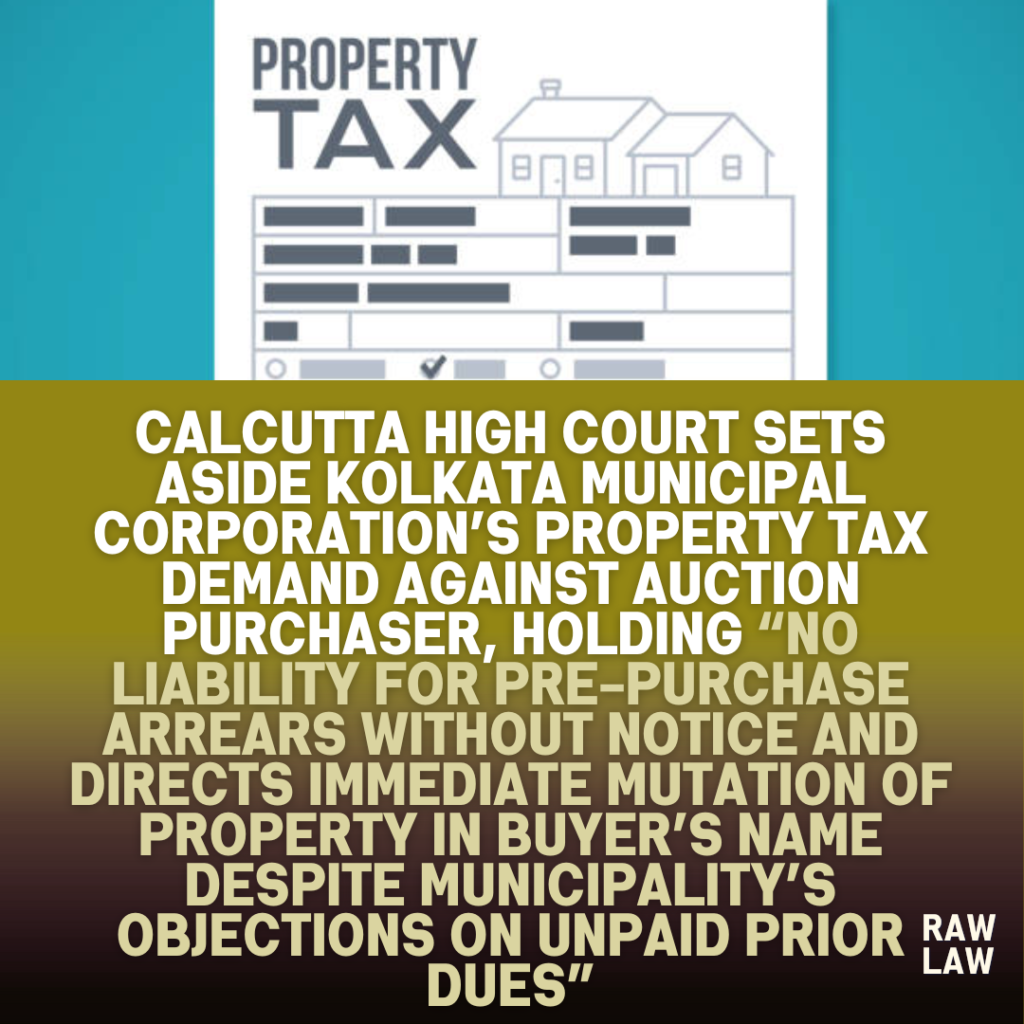Court’s Decision
The Calcutta High Court allowed the writ petition, quashing the Kolkata Municipal Corporation’s demand notices for property tax arrears for the period 2003–2011 raised against an auction purchaser of a property sold through official liquidation proceedings. It held that the buyer could not be made liable for pre-purchase dues without prior notice, particularly where the Official Liquidator had settled adjudicated claims with the corporation, which were accepted unconditionally. The Court directed the corporation to immediately mutate the property in the petitioner’s name within four weeks, subject only to payment of property tax accruing post-purchase.
Facts
A property at 35, Acharya Prafulla Chandra Road, Kolkata, originally owned by a company in liquidation, was sold in a court-supervised auction, with the sale confirmed in May 2017 and a deed of conveyance executed in March 2019 in the petitioner’s favour. The petitioner sought mutation but was denied on grounds of pending arrears from 2003 to 2011 amounting to over Rs. 59 lakhs. The Official Liquidator had earlier adjudicated KMC’s claims at Rs. 19.13 lakhs for earlier periods, which were paid and accepted without objection. The petitioner challenged the demand, arguing non-liability for pre-purchase arrears where no notice of dues was provided prior to purchase.
Issues
- Whether an auction purchaser can be held liable for property tax arrears for a period prior to the date of purchase without constructive or actual notice of such dues.
- Whether KMC’s refusal to mutate the property citing unpaid prior dues is legally sustainable.
- Whether the Official Liquidator’s payment of adjudicated claims to KMC bars further claims for earlier periods.
Petitioner’s Arguments
The petitioner argued that:
- The property was purchased through court auction and possession taken after conveyance in March 2019, limiting liability for property tax to post-purchase periods only.
- The Official Liquidator had settled KMC’s claims, which were accepted without protest, and no further claims for earlier periods could be raised.
- There was no notice, actual or constructive, of any pre-purchase tax dues; hence, there was no liability under settled law.
- KMC’s refusal to mutate the property on these grounds was illegal, hindering the petitioner’s lawful rights over the property.
Respondent’s Arguments
KMC argued that:
- Under Section 183(5) of the KMC Act, mutation requires payment of arrears associated with the property.
- The petitioner, as the current owner, was liable for prior dues, and non-payment justified refusal of mutation.
- The payment made by the Official Liquidator only settled dues up to August 1999 and did not cover the period from 2003 to 2011.
- The auction purchaser took the property on an “as-is-where-is” basis, and hence the liability for prior dues attached to the property.
Analysis of the Law
The Court examined:
- The principle that municipal taxes are personal liabilities and do not create an encumbrance unless explicitly notified.
- The settled law that auction purchasers without notice, actual or constructive, of pre-purchase dues are not liable for prior arrears.
- That the Official Liquidator’s adjudicated payment settled KMC’s claim as an unsecured creditor, precluding further claims.
- The interpretation of “encumbrances” in auction sales under A.I. Champdany Industries Ltd. v. Official Liquidator and related precedents.
Precedent Analysis
The Court relied upon:
- Municipal Board, Cawnpore v. Roop Chand Jain: Auction purchasers are protected where there is no notice of prior dues.
- Ahmedabad Municipal Corporation v. Haji Abdulgafur: There must be notice for constructive liability of dues.
- A.I. Champdany Industries Ltd. v. Official Liquidator: Municipal taxes are personal liabilities, not encumbrances, unless disclosed.
It distinguished: - Municipal Corporation of Delhi v. Trigon Investment: Different statutory context under Delhi law.
- Rashmoy Das v. KMC: Factually distinct regarding mutation conditions.
- Official Liquidator v. Ujjain Nagar Palika Nigam: Not relevant to the petitioner’s liability in auction purchase.
Court’s Reasoning
The Court found:
- No notice of prior tax dues was provided before the auction, and hence the petitioner could not be deemed to have constructive notice.
- KMC’s acceptance of payment from the Official Liquidator without protest concluded their claim as unsecured creditors.
- Liability for taxes prior to purchase cannot be imposed post-purchase on the buyer without prior notice and clear encumbrance disclosure.
- KMC’s refusal to mutate the property on grounds of pre-purchase dues was contrary to law.
Conclusion
The High Court:
- Quashed KMC’s demand letters dated April 8 and April 21, 2021.
- Directed KMC to immediately mutate the property in the petitioner’s name within four weeks, subject to payment of taxes from the date of purchase.
- Directed the petitioner to extend full cooperation for completing the mutation process.
Implications
- Strengthens auction purchasers’ rights against retrospective municipal tax claims without notice.
- Clarifies that municipal taxes are personal liabilities, not automatic encumbrances unless disclosed before sale.
- Reinforces the requirement of notice for pre-purchase liabilities to bind subsequent purchasers.
Referred Cases and Relevance
- Municipal Board, Cawnpore: Protected auction buyers from undisclosed prior charges.
- Ahmedabad Municipal Corporation: Clarified requirement of notice for liability.
- A.I. Champdany Industries Ltd.: Municipal taxes are personal liabilities unless specifically disclosed as encumbrances.
FAQs
Q1: Can an auction purchaser be held liable for prior municipal tax dues?
No, unless there was actual or constructive notice of dues before purchase, the purchaser is not liable.
Q2: Can KMC refuse mutation citing pre-purchase arrears?
No, mutation cannot be denied if the dues relate to a period before purchase without prior notice.
Q3: Does payment by the Official Liquidator bar further municipal claims?
Yes, payment and acceptance of adjudicated claims by the Official Liquidator without protest preclude further claims for those periods.



